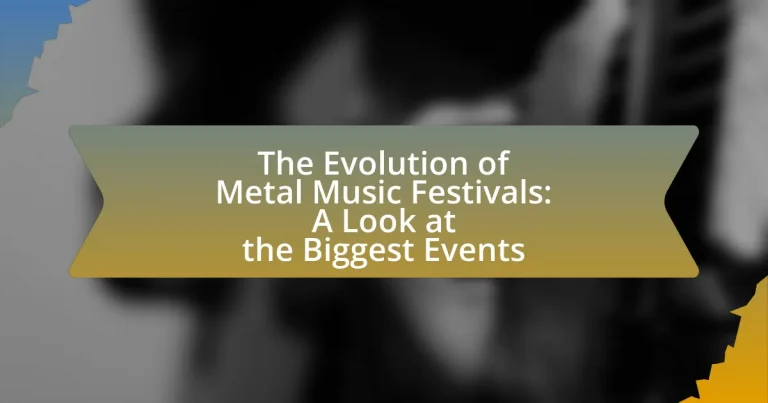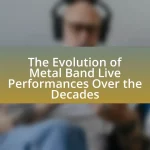Metal music festivals are large-scale events dedicated to celebrating metal music and culture, featuring a diverse lineup of bands across various subgenres. Originating in the late 1970s and early 1980s, these festivals have grown significantly, with notable examples like Download Festival and Wacken Open Air attracting tens of thousands of fans. The article explores the historical development of metal festivals, their impact on the music industry, and the unique characteristics that define them, including their role in promoting new artists and contributing to local economies. Additionally, it examines current trends, innovations, and future directions for these festivals in response to changing musical landscapes and global challenges.
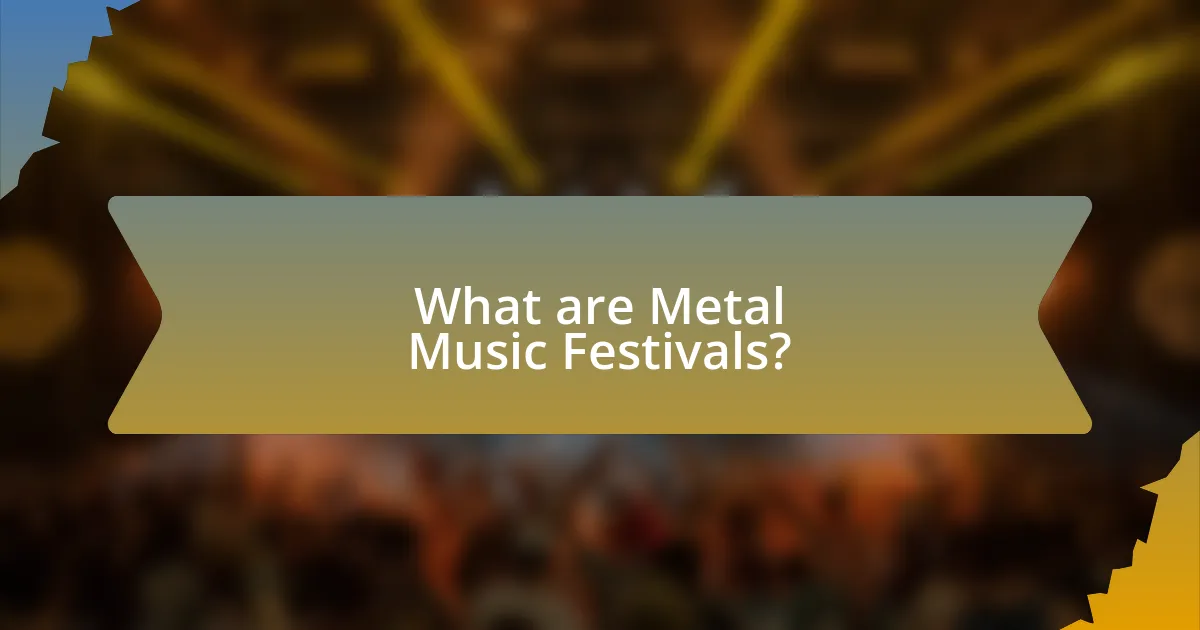
What are Metal Music Festivals?
Metal music festivals are large-scale events that celebrate metal music and culture, featuring multiple bands and artists performing over one or several days. These festivals often attract thousands of fans and include various subgenres of metal, such as heavy metal, thrash metal, and death metal. Notable examples include Download Festival in the UK and Wacken Open Air in Germany, which have become iconic in the metal community, showcasing both established and emerging artists. The growth of these festivals reflects the genre’s popularity, with attendance numbers often exceeding 100,000, highlighting their significance in the music industry.
How did Metal Music Festivals originate?
Metal music festivals originated in the late 1970s and early 1980s as a response to the growing popularity of heavy metal music. The first significant metal festival, the “Monsters of Rock,” took place in 1980 at Castle Donington in England, featuring prominent bands like Black Sabbath and Judas Priest. This event set a precedent for large-scale gatherings dedicated to metal music, showcasing multiple acts and attracting thousands of fans. The success of such festivals led to the establishment of others worldwide, including Wacken Open Air in Germany, which began in 1990 and has since become one of the largest metal festivals globally, further solidifying the festival culture within the metal genre.
What historical events contributed to the rise of Metal Music Festivals?
The rise of Metal Music Festivals was significantly influenced by the emergence of heavy metal as a distinct genre in the late 1960s and early 1970s, with bands like Black Sabbath and Led Zeppelin leading the way. The first major metal festival, the 1980 Monsters of Rock, held at Castle Donington in England, showcased the growing popularity of metal music and attracted large audiences, solidifying the festival format for the genre. Additionally, the 1985 Live Aid concert highlighted the potential of large-scale music events, inspiring subsequent metal festivals like Ozzfest, which began in 1996 and further established metal festivals as a staple in the music industry. These events not only provided a platform for emerging bands but also fostered a sense of community among metal fans, contributing to the genre’s enduring popularity.
How did early festivals shape the metal music scene?
Early festivals significantly shaped the metal music scene by providing a dedicated platform for bands to perform and fans to gather, fostering a sense of community and identity within the genre. Events like the 1980s Monsters of Rock festival in the UK showcased prominent metal acts, which helped to elevate the visibility of the genre and establish a loyal fan base. These festivals not only introduced new bands to wider audiences but also solidified the cultural significance of metal music, as they became annual traditions that fans eagerly anticipated. The success of these early festivals demonstrated the commercial viability of metal, leading to the proliferation of similar events worldwide, which further entrenched metal’s place in the music industry.
What are the key characteristics of Metal Music Festivals?
Metal music festivals are characterized by their focus on heavy metal genres, large-scale live performances, and a vibrant community atmosphere. These festivals typically feature multiple stages hosting a diverse lineup of bands, ranging from established acts to emerging artists, often spanning various subgenres like thrash, death, and black metal.
Additionally, metal festivals emphasize a strong sense of camaraderie among attendees, fostering a unique culture that includes fan interactions, merchandise stalls, and themed activities. The duration of these events often spans several days, allowing for extensive programming and a comprehensive experience for fans.
Notably, festivals like Download Festival and Wacken Open Air have become iconic, attracting tens of thousands of attendees and showcasing the global appeal of metal music. These events not only highlight the music but also serve as a celebration of the metal lifestyle, with elements such as elaborate stage designs, pyrotechnics, and immersive experiences that enhance the overall atmosphere.
What types of performances are typically featured?
Metal music festivals typically feature live performances from various subgenres of metal, including heavy metal, thrash metal, death metal, black metal, and power metal. These performances often include headlining acts from well-known bands, as well as emerging artists, providing a diverse lineup that appeals to a wide audience. Festivals like Download Festival and Wacken Open Air showcase multiple stages, allowing for simultaneous performances and a rich variety of musical experiences.
How do festival locations influence the experience?
Festival locations significantly influence the experience by shaping the atmosphere, accessibility, and cultural context of the event. For instance, outdoor festivals in scenic locations, such as mountains or beaches, enhance the sensory experience through natural beauty and open space, which can elevate the enjoyment of performances. Additionally, the accessibility of a location affects attendance; festivals in urban areas often attract larger crowds due to better transportation options and accommodations. Cultural context also plays a role; festivals held in regions with rich musical heritage can deepen the connection between attendees and the music, as seen in events like Wacken Open Air in Germany, which draws on the country’s strong metal culture. These factors collectively create a unique festival experience that can vary widely based on location.
Why are Metal Music Festivals significant in the music industry?
Metal music festivals are significant in the music industry because they serve as major platforms for showcasing talent, fostering community, and driving economic impact. These festivals, such as Download Festival and Wacken Open Air, attract thousands of fans and provide opportunities for both established and emerging artists to perform, thereby enhancing their visibility and career prospects. According to a report by the UK Music Industry, festivals contribute over £1 billion to the UK economy, highlighting their financial importance. Additionally, metal festivals create a unique cultural experience that strengthens the bonds among fans, artists, and the genre itself, solidifying metal’s place in the broader music landscape.
What role do they play in promoting new artists?
Metal music festivals play a crucial role in promoting new artists by providing them with a platform to perform in front of large audiences. These festivals often feature a diverse lineup that includes emerging bands alongside established acts, which helps to increase visibility for new talent. For instance, festivals like Download and Wacken Open Air have been known to showcase up-and-coming bands, allowing them to gain exposure and connect with fans. This exposure can lead to increased streaming numbers, social media following, and opportunities for future gigs, thereby significantly impacting the careers of new artists in the metal genre.
How do they impact the local economy?
Metal music festivals significantly impact the local economy by generating substantial revenue through tourism, hospitality, and local business engagement. For instance, festivals attract thousands of attendees, leading to increased spending on accommodations, food, and merchandise. A study by the University of California found that music festivals can contribute over $10 million to local economies, with attendees spending an average of $300 per person during their stay. Additionally, local businesses often see a boost in sales, as they cater to the influx of visitors, creating jobs and stimulating economic growth in the area.
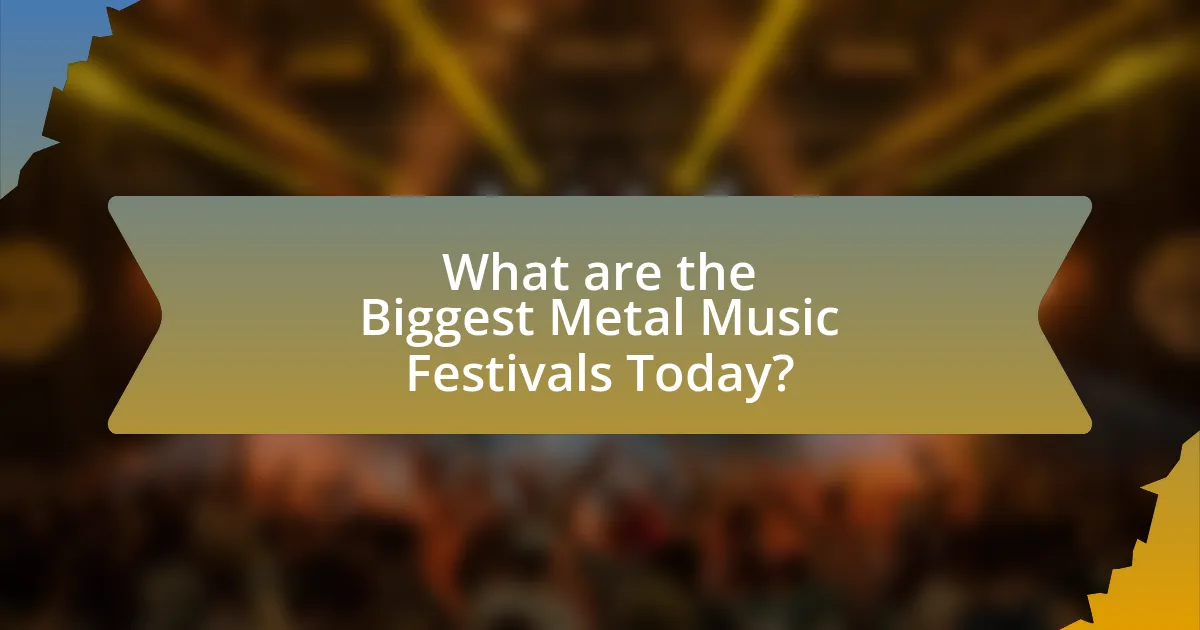
What are the Biggest Metal Music Festivals Today?
The biggest metal music festivals today include Download Festival, Wacken Open Air, and Hellfest. Download Festival, held annually in the UK, attracts over 100,000 attendees and features top metal acts. Wacken Open Air, located in Germany, is one of the largest metal festivals globally, drawing around 75,000 fans each year and showcasing a diverse lineup of metal genres. Hellfest, in France, also hosts approximately 60,000 attendees and is known for its extensive lineup of both established and emerging metal bands. These festivals are significant in the metal music scene, providing platforms for artists and fostering community among fans.
Which festivals are considered the largest in the world?
The largest festivals in the world include the Carnival in Rio de Janeiro, Oktoberfest in Munich, and the Diwali festival in India. Carnival attracts millions of participants and spectators, featuring vibrant parades and samba music, with an estimated 2 million people attending daily. Oktoberfest, known for its beer tents and traditional Bavarian culture, draws around 6 million visitors over its 16- to 18-day duration. Diwali, celebrated by over a billion people globally, marks the Hindu New Year with fireworks, feasts, and cultural events. These festivals are recognized for their massive attendance and cultural significance.
What makes Download Festival a standout event?
Download Festival is a standout event due to its unparalleled lineup of heavy metal and rock artists, attracting over 100,000 attendees annually. The festival, held at Donington Park in the UK since 2003, features iconic headliners such as Metallica, Iron Maiden, and Slipknot, solidifying its reputation as a premier destination for metal fans. Additionally, Download Festival offers a unique atmosphere with a strong sense of community, diverse activities, and camping options, enhancing the overall experience for attendees. The festival’s consistent growth and ability to adapt to the evolving music scene further contribute to its status as a leading event in the metal music festival landscape.
How does Wacken Open Air maintain its reputation?
Wacken Open Air maintains its reputation through a combination of high-quality lineups, exceptional organization, and a strong community focus. The festival consistently features top-tier metal bands, attracting both legendary acts and emerging artists, which enhances its appeal to a diverse audience. Additionally, Wacken Open Air is known for its meticulous planning and execution, ensuring a seamless experience for attendees, as evidenced by its sold-out status for multiple years, with over 75,000 visitors annually. The festival also fosters a sense of community by engaging with fans through social media and offering various activities beyond music, such as workshops and meet-and-greets, which solidifies its standing as a premier metal festival globally.
What unique features do these festivals offer?
Metal music festivals offer unique features such as diverse lineups that include both established and emerging artists, creating a platform for discovery. These festivals often incorporate immersive experiences, such as themed stages, art installations, and interactive activities that enhance attendee engagement. Additionally, many festivals provide camping options, fostering a communal atmosphere among fans, which is a hallmark of the metal community. For instance, events like Download Festival in the UK and Wacken Open Air in Germany are known for their extensive merchandise offerings and meet-and-greet opportunities with artists, further enriching the festival experience.
How do they enhance the fan experience?
Metal music festivals enhance the fan experience by providing immersive environments that foster community and engagement among attendees. These festivals often feature multiple stages with diverse lineups, allowing fans to discover new bands while enjoying performances from their favorite artists. Additionally, interactive elements such as meet-and-greets, merchandise stalls, and food vendors create a vibrant atmosphere that encourages social interaction. According to a study by the University of Southern California, live music events significantly boost social connections and emotional well-being, reinforcing the idea that festivals serve as vital spaces for fans to connect with both the music and each other.
What innovations have been introduced in recent years?
Recent years have seen several innovations in metal music festivals, including enhanced virtual experiences, improved sustainability practices, and advanced ticketing technologies. Virtual experiences have become prominent, allowing fans to attend festivals online through live streams and interactive platforms, exemplified by events like Download Festival’s virtual edition in 2020. Sustainability practices have also gained traction, with festivals like Hellfest implementing eco-friendly initiatives such as waste reduction and renewable energy sources. Additionally, advanced ticketing technologies, including blockchain for secure transactions and dynamic pricing models, have streamlined the purchasing process, as seen in festivals like Wacken Open Air. These innovations reflect the evolving landscape of metal music festivals, adapting to both technological advancements and environmental concerns.
How do these festivals adapt to changing trends in music?
Metal music festivals adapt to changing trends in music by diversifying their lineups to include emerging genres and artists that resonate with contemporary audiences. For instance, festivals like Download and Wacken Open Air have incorporated elements of electronic music and collaborations with hip-hop artists, reflecting the growing popularity of these genres among metal fans. This adaptation is supported by data showing that festivals that embrace a wider range of musical styles tend to attract larger audiences, as evidenced by the increased attendance figures at events that feature diverse acts. Additionally, many festivals utilize social media and streaming platforms to gauge audience preferences, allowing them to curate lineups that align with current musical trends.
What genres are increasingly represented at these festivals?
Genres increasingly represented at metal music festivals include progressive metal, post-metal, and metalcore. The rise of progressive metal is evident as bands like Dream Theater and Opeth gain popularity, showcasing complex musical structures and diverse influences. Post-metal, characterized by its atmospheric soundscapes, has seen bands like Neurosis and Cult of Luna headlining major festivals, reflecting a shift towards more experimental sounds. Additionally, metalcore has surged in representation, with bands such as Killswitch Engage and Parkway Drive drawing large crowds, indicating a growing acceptance of hybrid genres within the metal community. This trend highlights the evolving landscape of metal festivals, where diverse subgenres are embraced alongside traditional heavy metal acts.
How do festivals incorporate technology to engage audiences?
Festivals incorporate technology to engage audiences through interactive experiences, live streaming, and social media integration. For instance, many festivals utilize mobile apps that provide real-time updates, schedules, and interactive maps, enhancing attendee navigation and engagement. Additionally, live streaming allows fans who cannot attend in person to experience performances remotely, expanding the audience reach significantly. Social media platforms are leveraged for audience interaction, enabling attendees to share their experiences instantly, which fosters a sense of community and participation. According to a report by Eventbrite, 70% of festival-goers engage with event content on social media, highlighting the effectiveness of these technological integrations in enhancing audience engagement.
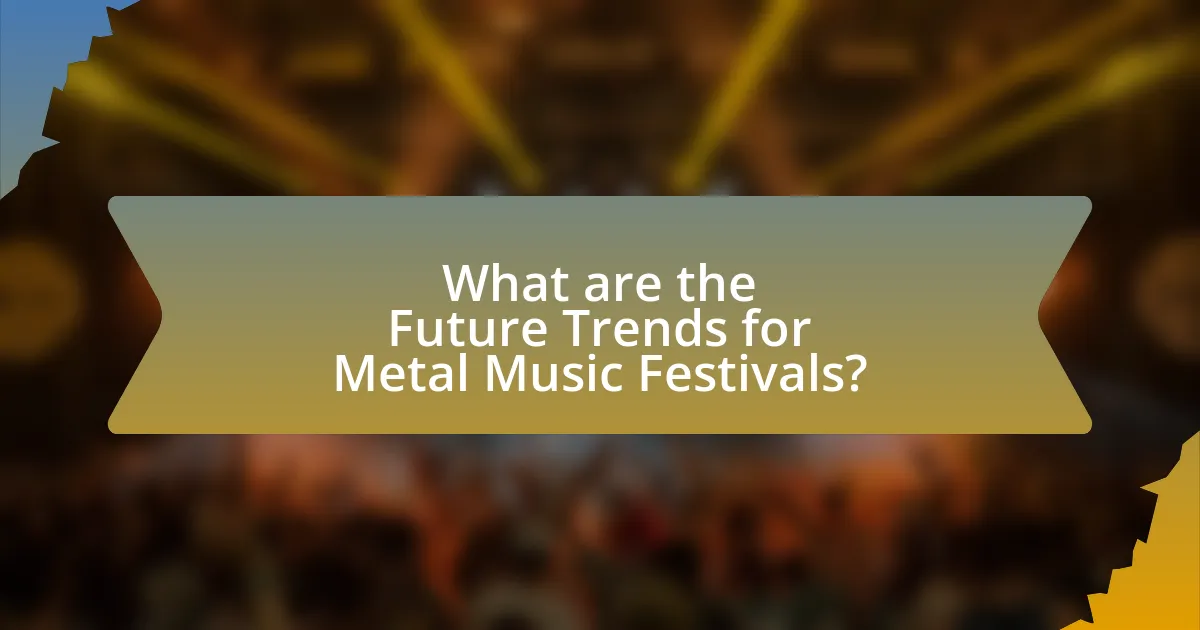
What are the Future Trends for Metal Music Festivals?
Future trends for metal music festivals include increased integration of technology, a focus on sustainability, and the diversification of lineups to include a wider range of sub-genres and international acts. The use of virtual reality and live streaming has become more prevalent, allowing fans to experience festivals remotely, which was notably accelerated by the COVID-19 pandemic. Additionally, many festivals are adopting eco-friendly practices, such as reducing waste and promoting renewable energy sources, in response to growing environmental concerns among attendees. The expansion of lineups to feature diverse acts not only attracts a broader audience but also reflects the evolving nature of metal music itself, as seen in festivals like Download and Hellfest, which have increasingly included bands from various genres and backgrounds.
How are festivals evolving in response to global challenges?
Festivals are evolving by incorporating sustainability practices and digital innovations to address global challenges such as climate change and public health crises. For instance, many metal music festivals are now implementing eco-friendly measures, including waste reduction initiatives and carbon offset programs, to minimize their environmental impact. Additionally, the COVID-19 pandemic prompted festivals to adopt hybrid formats, combining in-person and virtual experiences, which expanded accessibility and allowed for safer participation. These adaptations reflect a broader trend in the festival industry to respond proactively to pressing global issues while maintaining audience engagement and cultural relevance.
What measures are being taken for sustainability?
Metal music festivals are implementing various measures for sustainability, including waste reduction initiatives, renewable energy usage, and eco-friendly transportation options. For instance, many festivals are adopting recycling and composting programs to minimize landfill waste, with some events reporting up to 70% waste diversion rates. Additionally, the use of solar panels and wind energy is becoming more common, allowing festivals to reduce their carbon footprint significantly. Furthermore, organizers are promoting public transport and carpooling to decrease emissions associated with travel to the events. These measures reflect a growing commitment within the metal music festival community to address environmental concerns and promote sustainability.
How has the COVID-19 pandemic affected festival planning?
The COVID-19 pandemic has significantly disrupted festival planning by imposing restrictions on large gatherings and altering public health protocols. Many festivals were canceled or postponed, leading to financial losses for organizers and vendors. For instance, in 2020, over 90% of music festivals worldwide were either canceled or rescheduled, according to a report by the International Festivals & Events Association. Additionally, festivals that resumed in 2021 and 2022 had to implement safety measures such as social distancing, reduced capacity, and vaccination requirements, fundamentally changing the planning process and attendee experience.
What innovations can we expect in the coming years?
In the coming years, we can expect innovations in metal music festivals that include enhanced virtual reality experiences, improved sustainability practices, and advanced ticketing technologies. Virtual reality will allow fans to experience live performances from anywhere in the world, as seen in recent events that utilized VR to engage remote audiences. Sustainability practices will likely focus on reducing waste and carbon footprints, as many festivals are already implementing eco-friendly initiatives, such as reusable cups and solar-powered stages. Advanced ticketing technologies, including blockchain for secure transactions and dynamic pricing models, will streamline the purchasing process and enhance fan engagement. These trends reflect the ongoing evolution of the festival experience, driven by technological advancements and a growing emphasis on environmental responsibility.
How might virtual reality change the festival experience?
Virtual reality (VR) might change the festival experience by allowing attendees to immerse themselves in a fully interactive environment, regardless of their physical location. This technology can enable fans to experience live performances, explore festival grounds, and engage with other attendees in a virtual space, enhancing accessibility for those unable to attend in person. For instance, a study by the International Journal of Human-Computer Interaction highlights that VR can create a sense of presence and social interaction, which are crucial elements of the festival atmosphere. By integrating VR, festivals can reach a broader audience, offering unique experiences such as backstage tours or virtual meet-and-greets with artists, thus transforming how fans connect with music and each other.
What role will social media play in future festivals?
Social media will play a crucial role in future festivals by enhancing audience engagement and facilitating real-time communication. As festivals increasingly rely on platforms like Instagram, Twitter, and TikTok, they can promote events, share live updates, and create interactive experiences for attendees. For instance, a study by Eventbrite found that 80% of festival-goers use social media to discover events, highlighting its importance in driving attendance and fostering community. Additionally, social media allows for user-generated content, enabling fans to share their experiences, which can amplify the festival’s reach and influence.
What tips can attendees follow for a great festival experience?
To have a great festival experience, attendees should plan ahead by researching the lineup, scheduling performances, and familiarizing themselves with the venue layout. This preparation allows attendees to maximize their time and enjoy their favorite acts without missing key performances. Additionally, staying hydrated and taking breaks can help maintain energy levels throughout the event, as festivals often involve long hours of standing and walking. According to a study by the University of California, hydration significantly impacts physical performance and overall enjoyment at events. Lastly, engaging with fellow festival-goers enhances the experience, as social interactions contribute to a sense of community and shared enjoyment, which is a hallmark of metal music festivals.
How can fans prepare for attending a metal music festival?
Fans can prepare for attending a metal music festival by planning their travel, securing accommodations, and organizing essential items. Planning travel involves booking transportation in advance to avoid last-minute issues, while securing accommodations ensures a place to rest, especially during multi-day festivals. Essential items include ear protection to safeguard hearing, comfortable clothing and footwear for long hours of standing, hydration supplies to stay refreshed, and a portable charger for electronic devices. These preparations enhance the overall experience and ensure fans can fully enjoy the performances without unnecessary distractions or discomfort.
What are the best practices for enjoying the festival atmosphere?
To enjoy the festival atmosphere, attendees should immerse themselves in the experience by engaging with the music, participating in activities, and connecting with fellow festival-goers. Engaging with the music involves actively listening to performances, dancing, and appreciating the artistry of the bands, which enhances the overall enjoyment. Participating in festival activities, such as workshops or art installations, allows for a deeper connection to the festival’s culture. Connecting with others fosters a sense of community, which is a hallmark of metal music festivals, as evidenced by the camaraderie often seen in festival crowds. These practices collectively enhance the festival experience, making it more memorable and enjoyable.
